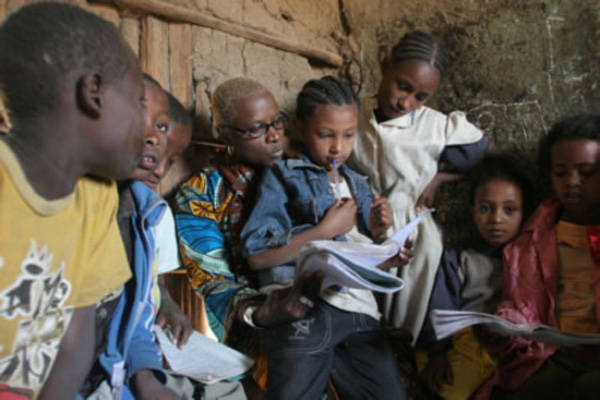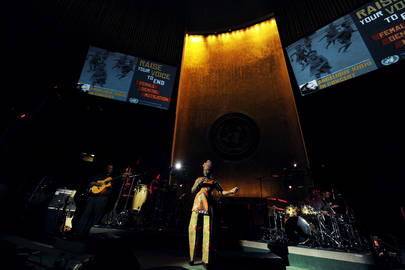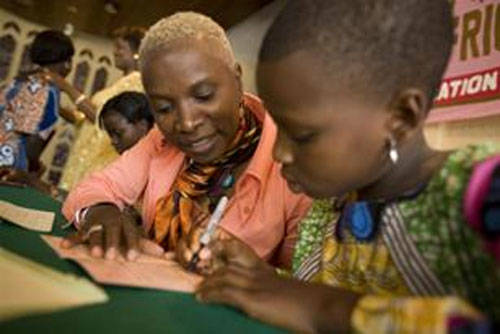Everyone with Angelique Kidjo. With her Africa.
Everyone is on their feet – people of every age, ethnicity, race, religion, and status. Everyone jumps up to dance, cradled by the voice of Angelique Kidjo. It was not in a concert hall or at a stadium, a park, or even in a public square. It was inside the historic hall of the General Assembly at the United Nations. Many people in the audience must have asked themselves the other night: What if there was this kind of festive atmosphere at the Glass House more often? It would no doubt be beneficial.
Angelique is a true force of nature. She blew everyone away with a musical mashup of reggae, gospel, jazz, and Afrobeats, demonstrating once again that music has no one language. It’s a language which unites everyone and everything.
“Raise Your Voice to End Female Genital Mutilation” was the title of the event, a concert sponsored by the Permanent Mission of Italy to the United Nations, in collaboration with UNICEF and UNFPA to raise awareness about this important issue.
I was there, among so many others, sitting and then standing, jumping, and listening after attending the press conference with Italian Minister Elsa Fornero and Angelique Kidjo. After watching a video and, of course, hearing the speeches by the women, I was proud – I confess! – to finally see two women who represent me.
I impulsively wrote on Facebook: Happy as a woman first, then as an Italian. Someone in my thread added: “I’m not Italian, but as a woman I felt proud.”
As soon as Angelique began to sing, I regret that I didn’t bring a camera to record the performance. It was a concert unlike any other. Luckily it was broadcast live by the U.N.’s webcast (and carried as well by i-Italy), and you can see it again by clicking here. But recording her as she danced among the people would have captured the intensity of the concert. It was an event that deserved a different perspective. So at this point I can only use my words to describe a memorable and emotional evening.
Angelique Kidjo is originally from Benin in West Africa. She is a Grammy award-winning singer and a Goodwill Ambassador for UNICEF. She can not only sing and dance but also knows how to touch the audience with her words. She practically conducted the press conference, where I saw Minister Fornero act as her straight man, gently and voluntarily allowing her to take over.
Her words were effective because they were to the point especially when responding to reporters, but during the concert her words were given their natural outlet. From the very first notes, her voice, full of both the good and bad of Africa, shook the huge hall at the United Nations. Her fluid gestures and impressive physicality lured the crowd to its feet and urged audience members to get up and dance, even those who appeared reserved and unassuming.
Besides fighting for a cause and speaking out against female genital mutilation, Angelique has also witnessed the pride of being a woman. She’s done this, I think, by closely observing everything around her, despite the difficulties on her continent.
She’s one example (and there are so few portrayed in the media) of a woman who lives without compromise in a world full of superficial images of women. How different she is from so many other singers and dancers! Let’s not even mention starlets, show girls, and reality TV stars. She embodies a great message of simplicity and elegance. It makes you reflect on the fact that, even in this day and age of globalization, she is from Africa.
She is an alternative to so many Western clichés – the stereotypical image of a woman that still seems to be a role model for so many, especially young people.
“When I saw that the barbaric practice of female genital mutilation was a problem that even plagued European countries, a warning bell rang inside of me. I had to do something,” Angelique told reporters from around the world. She did so by investing in the cause – as we have seen – and by testifying to the pride she feels for her continent in order to get approval for a U.N. resolution against this practice.
She comes from a poor family of ten children. But the few references to her father and mother in her speech allowed a sense of great richness to permeate her life – it comes from wisdom that is priceless. It is wealth that stems from dignity, work, helping others, and a sense of responsibility. And it comes from the music – authentic music that not only sells records but that overcomes barriers – that lives inside her.
Petite Fleur is the title of a song she performed at the concert that encompassed the most moving moment. Angelique said that she sang for her father, and dedicated it to all the little girls who suffered from genital mutilation.
I’m speaking less about Minister Fornero and yet I’m sure that she won’t be offended. In recent days the spotlight has been focused squarely on her, and her statements have been quoted everywhere.
Seeing her in New York, up close, Minister Fornero has presided over the last few days at the U.N. with intelligence, professionalism, seriousness, and without excessive grandstanding. As I attended the press conference at the U.N., I felt a strong need and desire to pay close attention. A few days before International Women’s Day (and also the inevitable rhetoric that it bring after so many years), I carry this overwhelmingly positive feeling with me. I certainly tried to do so at other times, for example with Emma Bonino, but the fact that Elsa Fornero is a minister in our republic gives me a deep sense of satisfaction. This is, nevertheless, independent of the controversy that surrounds her management of other policies that make up her multi-faceted ministry.
I would like to conclude by underscoring that among the many battles that the African singer fights on behalf of her continent, there is the most important battle that underlies everything: the promotion of female education.
Angelique Kidjo insists that education would radically change the face of Africa, thereby combating the poverty that allows it to remain backwards. Investing in culture is the first priority. I say, not only in Africa.







































i-Italy
Facebook
Google+
This work may not be reproduced, in whole or in part, without prior written permission.
Questo lavoro non può essere riprodotto, in tutto o in parte, senza permesso scritto.